Subscribe to ‘Words Of Hope’
Get our emails direct to your Inbox with updates about all our campaigns, trips and events.
An appeal to help the communities of Teustepe in Nicaragua to flourish. St Mary’s Redbourn is working with Amos Trust to provide water capture systems, training and crop-resistant plants for 7 rural communities in Teustepe, Nicaragua. Will you help us raise £10,000?
Arsenia’s story
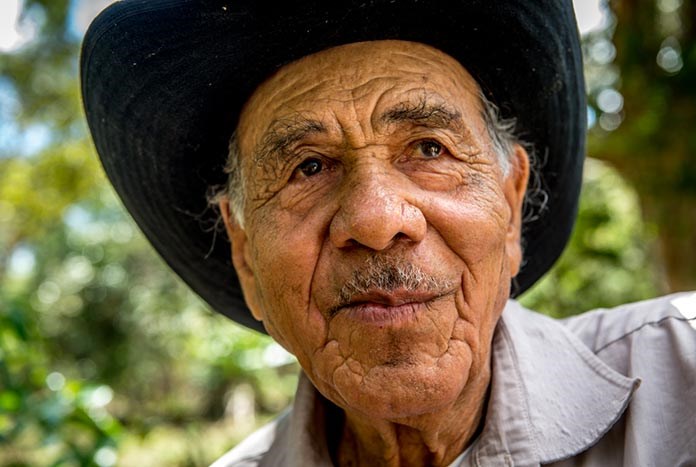
Arsenia lives in San Diego, a small village at the end of a dirt road that is impassable during the rainy season. Climate change means the community has experienced three severe hurricanes in two years. These destroyed crops, blew the roofs off houses and cut the village off for weeks. The community had no electricity before we started working with them through our partner CEPAD.
“Look at our tomatoes — we could never grow these before. Now we sell a bucket for 600 Córdobas (£10). We sell our peppers as well — three for ten Córdobas.” Arsenia
CEPAD helped the community secure electricity and set up a reservoir above the village. They also provided pipes and rubber tubes so that gravity distributed the water to where it was needed. CEPAD’s agronomists (experts in soil and crop production) provided seeds and taught farmers to plant a wider variety of crops. They showed them how to preserve the fragile soil and conserve water.
Arsenia says: “Look at our tomatoes — we could never grow these before. Now we sell a bucket for 600 Córdobas (£10). We sell our peppers as well — three for ten Córdobas. We’ve been taught to plant them alongside watermelon plants, which come through as the pepper season ends. We also grow cucumbers and squash, and plan to grow plantain, mangos, pineapples and avocados.”
“We no longer buy fertilisers because CEPAD have shown us how to make our own organic fertilisers and pesticides. They even gave us a manual, so we know how to grow all the new crops. By the end of this month, we will have saved enough to buy the extra plastic tubing and rubber pipework that we need to irrigate the rest of our land. Now we need to raise enough to fence that land with chicken wire to stop chickens, goats and pigs from eating the crops!”
This year, St Mary’s Redbourn hopes to raise £10,000 to provide 49 micro dams (7 per community), 3 mini reservoirs and drought tolerant plants and to train and equip ten people from each of the 7 communitities to use new farming techniques.
Changing climates
Since 2020, Nicaragua has been experiencing La Niña, the colder and wetter part of the El Niño climate pattern. This has resulted in higher rainfall for Nicaragua’s dry belt and three devastating hurricanes — made more severe by climate change. However, La Niña has moved into El Niño and changing weather patterns will bring further prolonged droughts followed by flash floods.
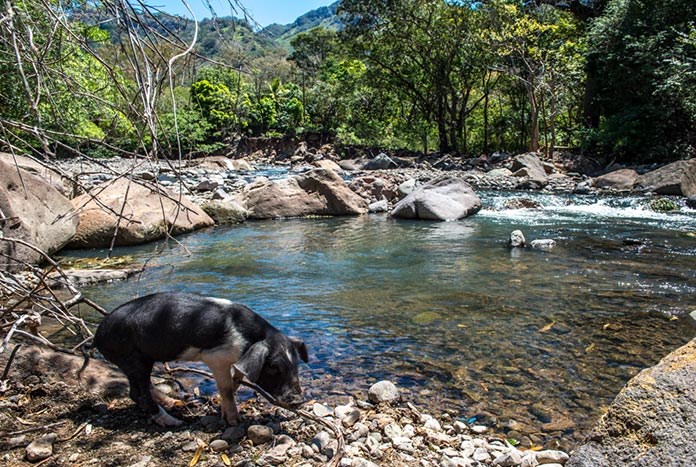
Fragile Water: Climate change makes it impossible to predict when the rain will come.
— — — — — — —
The impact of El Niño is felt severely in communities like those we work with in Teustepe, in Nicaragua’s dry belt. It means extreme heat and long periods of drought, followed by short periods of intense rain. Climate change now makes it impossible to predict when the rain will come, and what little rain there is comes at the wrong times of year for farming. Being able to conserve water has become critical for these communities to survive.
Our partner CEPAD has selected seven priority communities that they are supporting for an intervention cycle of five years. This intervention is shaped around each community’s specific needs but includes developing local leadership, supporting farmers to adapt to climate change, psycho-social support for young people, and two women’s empowerment programmes.
The impact of El Niño is felt very intensely in communities like those we work with in Teustepe, in Nicaragua’s dry belt.
The first of these is a new entrepreneurship and micro-credit programme, whilst the second provides training and resources so members of the local community can use the small areas of land around their homes (patios) to grow fruit and vegetables for their families.
Three years into this current cycle, six out of seven communities have electricity for the first time. Everyone struggled to grow anything due to a lack of water, but electricity opened up many possibilities. CEPAD has provided water pumps, meaning farmers can irrigate their crops. This is accompanied by training on how to grow a new range of drought-resistant crops.
Another huge benefit is that women and children no longer spend hours carrying water; children can focus on their education and women can take advantage of CEPAD’s microloans and training in entrepreneurship.
The new water pumps will be desperately important when El Niño next strikes — but they will not be enough. As much water as possible must be captured and used in ‘drip irrigation’ programmes so that the wells do not dry up and people still can access drinking water.
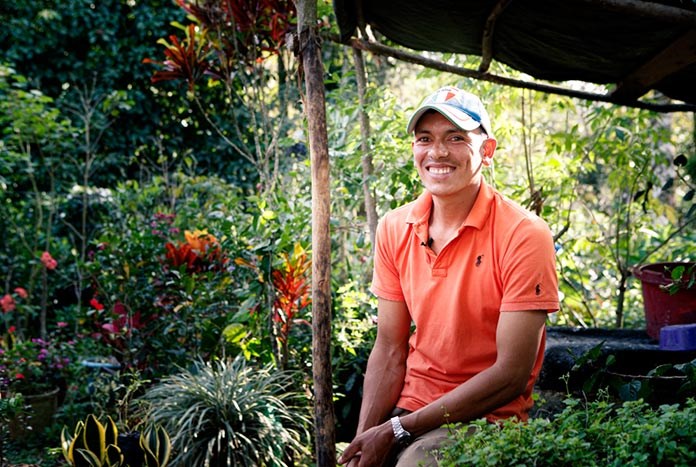
Thriving: Members of the local community can grow fruit and vegetables around their houses thanks to training and resources from CEPAD.
— — — — — — —
Conserving water
To prepare for the challenging weather patterns ahead, CEPAD needs to build more micro dams. Each one holds 15,000 litres of water. The farmers do the digging, and then CEPAD provides plastic lining sheets, rubber tubing, a hand pump and the pipes needed for a drip irrigation system.
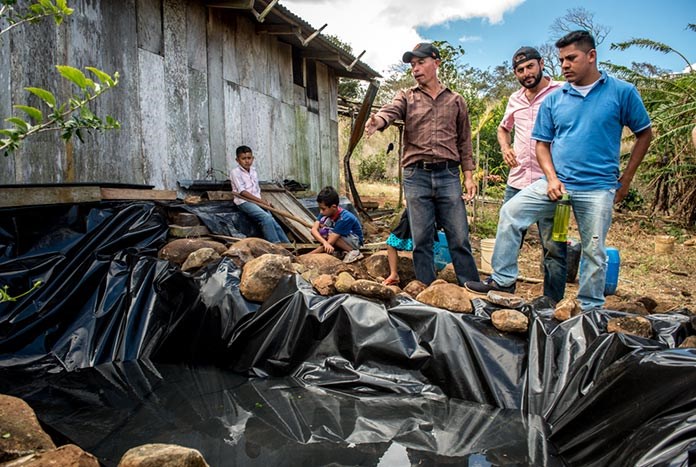
Water capture: Will you help us provide 7 micro dams for each of the 7 communities that we support?
— — — — — — —
Adapting techniques
We want to train farmers so that they can grow more water-tolerant crops as well as fruit and vegetables that are better suited to the changing conditions. They will be taught how to create organic pesticides, composts and fertilisers, and how to manage their water and soil effectively.
We will also extend this training to include those women who are looking to use their patios (small areas around their houses) to grow fruit and vegetables.
We will also provide farmers and patio owners with seeds to grow drought-tolerant crops, and with fruit and vegetable plants to increase the health of their communities and allow them to sell surplus products.
The total cost of this support is £10,000.
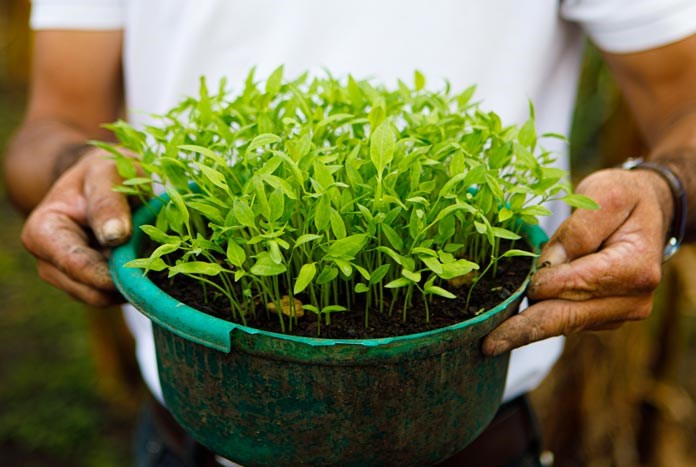
Drought-tolerant: We want to train farmers so that they can grow more resilient crops.
— — — — — — —
What could your money do?
Please help us to reach others like Arsenia by funding the practical help they need to survive, and thrive, in their changing climate.
Photography: Clive Horsman and Mark Kensett.
We work alongside grass-roots partners in Palestine, South Africa, Nicaragua, Burundi, India and Tanzania.
Reaching children on the streets, addressing their trauma, working with them and their families to reintegrate them into their homes, to realise their rights and recover their future.
Working with local and international peace activists, and partnering with grass-roots projects, to call for a just peace, reconciliation and full equal rights for all Palestinians and Israelis.
Addressing the impact of climate change and the causes of extreme poverty, building sustainable rural communities and empowering them to realise their rights.
Bringing people together to meet our partners from around the world, visiting the communities they work in and seeing their projects in action — building solidarity and lasting friendships.
Amos Trust
7 Bell Yard, London
WC2A 2JR
UK
Telephone:
+44 (0) 203 725 3493
Email:
[email protected]
Registered Charity No.
1164234

This item has been added to your shopping basket. Please click on the Checkout button below where you can choose your quantity.
Continue shopping Checkout Close